- Large Buildings
- Posted
Silver Lining
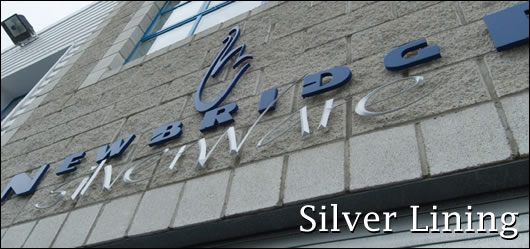
More and more businesses are looking to alternative energy sources to light, heat and cool their buildings but few have made a commitment to cutting carbon emissions to match Newbridge Silver, a silverware manufacturer in County Kildare. Jason Walsh visited the factory to find out more.
It is a truism that ideas don't change the world, action does, but to divorce one from the other is to do a disservice to the power of both. Action informed by rational thought is a powerful force for change in any aspect of society, even in construction and energy matters.
A major silverware and cutlery factory may seem an unlikely place to look for examples of sustainability, and yet, at Newbridge Silverware in County Kildare that's exactly what can be found. Moreover, the impetus for changing the factory's attitude to energy resources initially stemmed from one man watching a documentary film.
Managing director William Doyle takes up the story: "Our awareness was that there was a difficulty coming down the road," he told Construct Ireland. "This came from having watched a documentary called 'The End of Suburbia'. Prior to that I was aware of energy issues but the documentary heightened it. I was struck by it and decided to have a viewing [of the film] in-house."
Following the screening, William Doyle formed a troika dedicated to investigating practical answers to the energy question. The troika, composed of William and Jim Doyle alongside Richard Murphy, was set up to investigate the shift away from conventional energy.
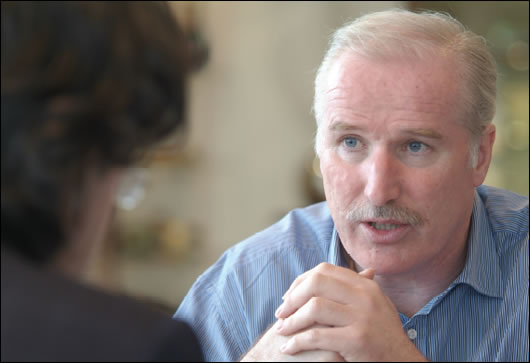
Richard Murphy noted the potential for questionable figures coming from oil producing countries: "It's hard to get fact and figures out of them because they're telling lies. The Opec countries [for example] have overstated their resources," he says.
In fact, speaking to William and Jim Doyle and Richard Murphy, it seems reasonable to say there is a touch of missionary zeal about the whole enterprise, albeit tempered by the fact that Newbridge Silverware is a business and must remain profitable, not a charity or state body with deep pockets and a mandate to spend, spend, spend.
Back to work
For Newbridge Silverware, practical considerations were paramount, William Doyle explains: "I am of the view that most governments are now driving [energy efficiency issues] not for ecological reasons but due to shortage." These concerns about future shortages play out in a very real way for the company: "We currently have an energy bill of a quarter of a million euros and that could quadruple in five years," he says, outlining a nightmare scenario that could cripple the broad economy and cause immense damage to individual companies.
The fact that Newbridge Silverware is not only a business but one that is actively engaged in material production is heartening. It is all too easy to criticise industry and yet it is the bedrock on which our society sits – without production there would be no wealth other than that associated with land, the least equitable form of economic activity. It is not particularly uncommon to hear sustainability advocates talk about moving toward a less urbanised and more rural future but this is simply not a realistic possibility. Moreover, there was never a time when rural life could have been characterised as fair, progressive, equitable or even particularly pleasant for the vast majority of people dependent on the land for a living, land that, almost invariably, they did not own.
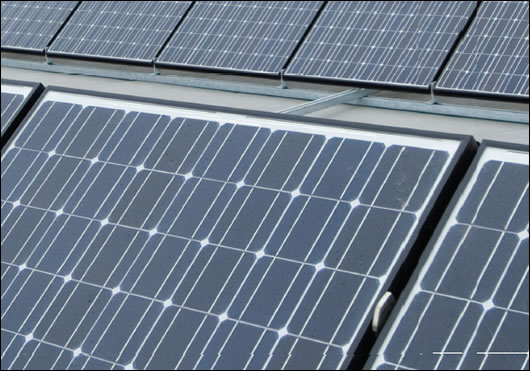
Roof-mounted PV panels overlooking the shopping centre and carpark in Newbridge
In Britain, for example, of the top twenty land owners fifteen are aristocrats and one is a sheik. Between these aristocrats, not including the sheik, 1,491,539 acres of land is privately owned, worth a staggering £17,438,000,000,000 (approx. €25,535,217,454,971) in 2001, numbers that should put a brake on anyone's ambition to return to the land. The reality is that such dreams are neither desirable or achievable – visions of mythical pasts are not conducive to meaningful futures.
Given this, never mind the fact that the vast majority of people have absolutely no interest in returning to agricultural modes of living, the fact that industry remains central to economic activity must be faced. Even if the direst predictions of oil peak theorists are to prove true, the answer surely lies in utilising other energy sources and maximising efficiency – something that Newbridge Silver is attempting to achieve.
"I spoke to Jim about the issue and he had some prior experience going back to the oil crisis of the 1970s," says William Doyle. "I gave Jim the task of investigating solutions."
Factory manager Jim Doyle explains: "Based on experiences during the 1970s I know that people got into energy conservation but once the oil price dropped back down they abandoned it.
"The group we formed [to investigate] was interesting. Local businesses and farmers became involved and we had numerous meetings. We looked at everything and came back with ideas and contacts. William allocated investment for 30kW of photovoltaic solar – it's grid-connected, which is quite unusual."
Connecting to the grid rather than batteries means even greater efficiency but not, as yet, any major revenue from selling power back to the ESB: "ESB really don't give much back, maybe one cent per unit," says Jim Doyle.
Sol victus
The central aspect of Newbridge Silverware's strategy for reducing its use of grid electricity is a large photovoltaic solar array.
The solar system was designed and installed by Cool Power, the company founded by Tim Cooper, the leading light behind Temple Bar's Green Building (see Construct Ireland issue 6 volume 3).
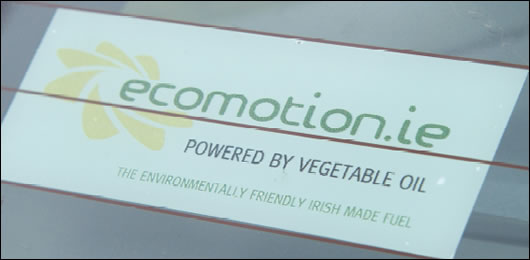
The Newbridge transport fleet display the fact of their PPO conversion
Cooper was contacted by Newbridge with a view to getting the business connected up with renewable energy.
"I was called down by Jim Doyle, the factory manager, last year," Cooper told Construct Ireland in a telephone interview. "Their managing director, William Doyle, is very interested in energy and environmental matters. I met the two of them and ran through what they could do. Initially they wanted to install combined heat and power but they don't have a huge heating load.
"The only thing that seemed to me to be possible would be photovoltaic solar – their main energy requirement is electricity. Wind wasn't suitable in the location but they did have a suitable roof for PV panels," says Cooper.
Cooper's first move was to analyse Newbridge Silver's actual electricity use by reading data he obtained from ESB: "ESB [can] send an absolutely precise log of electricity use over the last twelve months," he says. "It really is nice data."
After checking the figures and making a presentation to Newbridge Silver, Cool Power received an order in January 2007 and the firm installed the first array on April 4 of this year.
"April was so sunny that we got to test it running at absolute peak capacity," he says. The results were encouraging: "We got the orientation absolutely right, we took the time to get it right.
"It produced 23 per cent more power than the arrays in the Green Building. The Green Building's modules are polycrystaline [whereas] Newbridge's are monocrystaline. They produced 40 per cent more power than expected through a combination of greater efficiency and astonishing weather," says Cooper.
Cooper gives a figure of 1,050kWh per kilowatt peak efficiency: "We had been assuming 900, we're now assuming 1,000kWh.
"They're putting in 30 kW peak, that's 30,000kWh per annum," he says. "In round figures, 100,000 kWh of grid electricity will be displaced based on the DEAP figure of 2.7 times greater efficiency. That's equal to about 20 tonnes of carbon dioxide."
Cooper is clearly enthused by the progress made: "To me it's really exciting. It's a retrofit which is usually [more] difficult." he says.
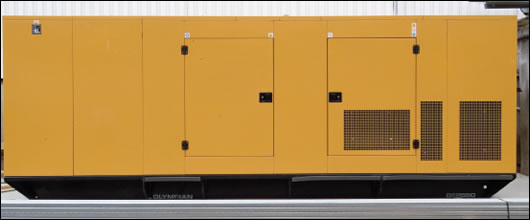
A diesel powered generation due for conversion to pure plant oil can supply more than the factory's entire electricity need
For Newbridge Silverware the solar system is an integral part of the efficiency drive and the electricity is currently used in the offices and attached restaurant: "PV cells won't drive the plant machinery," explains Jim Doyle, "But the main energy load is made up of many lighter loads. The PV cell is one of the simpler things to deal with – it's maintenance free and [once installed] you thereafter get free electricity.
Still, Jim Doyle laments Ireland's less than stellar rate of adoption for solar generated electricity and indicates that the government and ESB could do more to encourage local generation: "The German system offers very good paybacks for [both] industrial and domestic use. You get in the order of 40 to 50 cents per unit and many individuals have invested heavily in this. In Ireland there's no real incentive.
"I visited a so-called 'solar farm' in Germany that was covered in photovoltaic cells and could generate eight megawatts," he says.
"ESB should support a system like we have. It's safe and simple and has generated 2,800 kilowatt hours since installation," says Doyle, going on to note that it had generated 12 kWh by 11AM on the day of Construct Ireland's visit, this from a total of 70 solar cells connected to two inverters.
Oil growth
Of course, an enterprise on the scale of Newbridge cannot possibly hope to run its entire business on solar energy and there are other energy use issues to be considered.
For a start Newbridge Silverware makes use of several vehicles so switching away from oil-based fuel was a perfect complement to the company's overall strategy: "We looked at rapeseed oil fuel for our commercial vehicles and two have been converted," says Jim Doyle.
William Doyle explains: "We started with the company van as a pilot project, entirely powered by rapeseed oil." A Toyota Landcruiser has also been converted.
"Then we purchased hybrid cars for our reps – one Toyota Prius and one Saab 95 that runs on e85 green fuel."
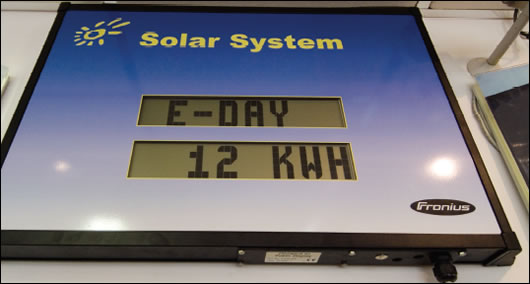
The solar panels' electricity production statistics are proudly displayed in the factory shop on-site for all to see
"It's an [ethanol] milk by-product," says Richard Murphy. "We're finding the Prius is OK but only gets similar miles per gallon as a diesel vehicle." According to Murphy the cars are more efficient at urban driving: "A lot of the time [in the city] you're consuming fuel and not moving."
Nevertheless, Murphy is optimistic about the prospects for seeing biofuels at the pump in service stations, even if progress is painfully slow: "[At the moment] Maxol are the only one with the [ethanol] fuel in some of its stations. Sugar-based fuel is something the government should have looked into before."
The diesel conversions, however, are met with universal enthusiasm: "The ultimate is the vegetable oil," says William Doyle.
The conversion of the diesel vehicles to run on vegetable oil was performed by Ecomotion. The company's Peter O'Neill explains: "It's a fledgling industry and you have to specialise. You can't just be a mechanic and start doing it – it's too labour intensive for a normal garage."
Ecomotion's Karl Chamberlane notes that conversions are popular with both commercial and domestic-use vehicles: "We've converted close to 50 vehicles. Of them, about 50 per cent have been commercial vehicles.
"A lot of people try one to begin with," he says. "We did a truck with Green Tiger Express, a car transporter that does all of Toyota's transport from the docks."
O'Neill worked for Esso after graduation and, while working there, a friend bought a conversion kit and O'Neill decided to investigate. The end result was that he went into business as Ecomotion, joined by Karl Chamberlane. "I took a leap of faith," he says.
"Two types of private people go with the vegetable oil," O'Neill says, "keen environmentalists and sales reps who do high mileage and get a good mileage rate from the boss."
A conversion is not a particularly cheap process but it is quick, taking only two days, and cost effective, even in the short term: "With the trucks it costs about €6,000 to convert. With a one driver shift they'll save €700 a month in fuel alone."
The oil used to run the vehicles is pure plant oil, as distinct from bio diesel: "Vegetable oil is pure plant oil. It is cold pressed virgin rapeseed oil whereas bio diesel is chemically cut. Bio diesel is a blend – chemically cleaned, recovered vegetable oil."
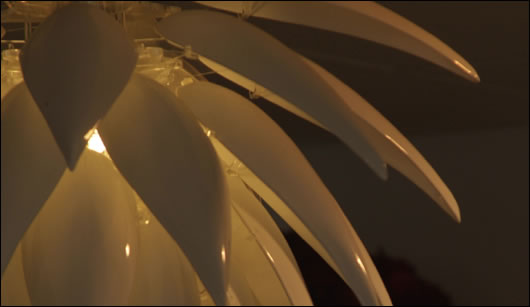
Elegant, yet energy efficient, lighting in use in Newbridge Silverware's restaurant
O'Neill points out that running diesel engines on pure plant oil is actually a return to their original fuel: "The diesel engine was originally designed to run on peanut oil. If you like, what we're doing is going back to its roots. The beauty of pure plant oil is that it is renewable."
He is also keen to stress the sustainable credentials of pure plant oil from the perspective of economic sustainability, as well as the fact that it doesn't tie you down: "The stuff is grown here in Ireland and it can be bought as a commodity on the open market," he says. "You can still put diesel in if, for example, you run out of fuel on the road – you're not stuck with vegetable oil."
O'Neill feels that for the pure plant oil industry to succeed in Ireland it will need to develop a local, decentralised logistics system: "Pure plant oil is grown here in Ireland, harvested by local farmers and ideally pressed and used in the local community. There's no waste with pure plant oil."
Newbridge has also invested in a diesel powered generator for further electricity production and this unit is also due to be switched over to run on pure plant oil by Biogreen. The company's maximum electricity demand from ESB is 320 kW and the generator will produce 400 kW, effectively taking the company off the grid. "We'll be running the generator on an eight hour cycle," says Jim Doyle.
John O'Meara of Eilish Oils, the pure plant oil company that supplies Newbridge Silver with its fuel, spoke to Construct Ireland on the telephone, explaining his vision for pure plant oil: "About one third of the country's fuel bill is for heat and another third is for transport," he said. Both of these he sees as possible applications for pure plant oil: "Heating from pure plant oil is generally done using combined heat and power. By doing this you get an additional twice as many kilowatts of hot water as you do of electricity. You're not wasting the heat that would normally go out the exhaust pipe. That makes it very efficient."
O'Meara has found that the Irish market is growing rapidly: "There is now a developing market because newer building regulations are coming out and people are looking at district heating. The more efficient systems tend to be the bigger ones, so sharing makes sense," he says.
O'Meara is keen to stress the importance of efficiency regardless of the fuel type being used: "Without a change in lifestyle we can be a lot more efficient," he says. "We can stretch our resources. Irrespective of what energy or fuel you're talking about, we can save anything up to 70 per cent and, on average, around fifteen per cent."
He sees this as vital because locally produced pure plant oil cannot replace traditional oils, barrel for barrel: "We can only make about ten per cent of our capacity for biofuels. It's more important to focus on energy efficiency than on where fuel comes from," he says.
Having said that, O'Meara does not see that as giving carte blanche to petroleum oils: "Having been efficient, the same argument can me made about the energy source. A simple measure is how effective is it at removing carbon from the air. Pure plant oil will take four to twenty-five times more CO2 out of the air than bio diesel."
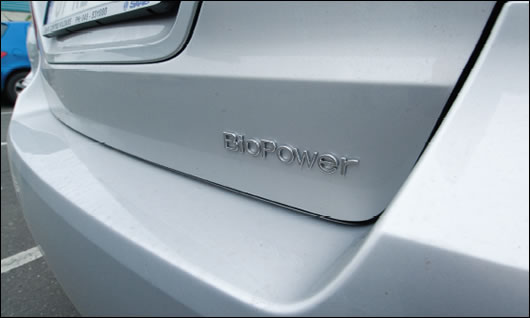
Saab biopower car, an ethanol-powered off-the-shelf car used by one of Newbridge's reps
Eilish Oils have also increased efficiency and energy yield in pure plant oil. Previously waste was sold as animal food but now it has become a fuel in its own right: "Pure plant oil is by far the most efficient biofuel. We buy rapeseed from farmers and crush it. For every three tonnes of rapeseed we get one tonne of oil and two tonnes of 'cake'. This is normally sold as animal food but because of the process we use, cold pressing, there is a high residual oil level in it so it makes a good solid fuel. It has 30 per cent more energy than wood pellets," says O'Meara.
Newbridge Silver did consider other forms of renewable energy: "The [wind] turbine at Dundalk Institute of technology is massive," says Jim Doyle,"it's a megawatt but on a calm day it will just sit there."
Richard Murphy elaborates: "There are a lot more still days than there are days with no sun and with solar power you still generate on a dull day."
Additionally, the company has made many small adjustments in order to make better and more efficient use of energy, whether generated on site or coming from the grid.
"We've put in numerous control systems within the plant and low energy lighting throughout the business," says Jim Doyle.
The recently extended 5,000 sq. metre. factory is well insulated with high density cladding and a double skin and the company is in the process of changing the original roof from a single clad one to an architectural frame with 80mm of insulation.
Additionally, some ceiling tiles have been replaced with perspex in order to maximise natural light, thus further reducing energy demand.
"We have a water plan," he says. "We use a well for all of our water and have a wastewater treatment plan for the electroplating process and we'll be recovering heat from the factory for the plant."
Managing director William Doyle does accept that Newbridge Silverware's decision to utilise renewable energy is somewhat unusual: "It's not everybody that's going to be enthused," he says." The payback for the photovoltaic solar system will be around seven years. For the whole operation, we don't know but we think the cost of electricity will continue to rise and the generator will be cost efficient."
Despite the positive predictions Jim Doyle remains uncertain as to whether more businesses will follow suit, but argues the process should be supported to a greater degree: "If the government offered a bit more, in whatever form, it would be a lot more common."
Selected project team members
Client: Newbridge Silverware
Photovoltaics: Coolpower
Pure plant oil (PPO) supply for vehicles: Eilish Oils
Vehicle conversion to PPO: Ecomotion
Standby generator conversion & PPO supply: Biogreen
Wood pellet boilers: Kedco
Standby generator: McCormack McNaughton
- Articles
- Large Buildings
- Silver Lining
- photovoltaics
- Newbridge Silverware
- wood pellet boilers
- biofuel
- pure plant oil
- hybrid
Related items
-
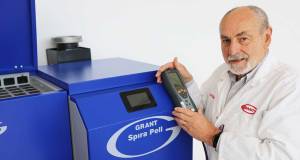 Grant launches Spira Pell condensing wood pellet boiler model
Grant launches Spira Pell condensing wood pellet boiler model -
 Ireland's new central bank hits nZEB & BREEAM outstanding eco rating
Ireland's new central bank hits nZEB & BREEAM outstanding eco rating -
 The West Midlands eco house with no energy bills
The West Midlands eco house with no energy bills -
 Ground-breaking housing scheme captures one developer’s journey to passive
Ground-breaking housing scheme captures one developer’s journey to passive -
 Welsh school fuses passive & eco material innovation
Welsh school fuses passive & eco material innovation -
 East London passive school promotes active learning
East London passive school promotes active learning -
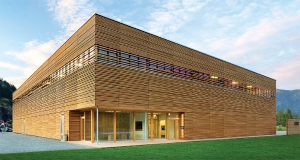 International selection - issue 11
International selection - issue 11 -
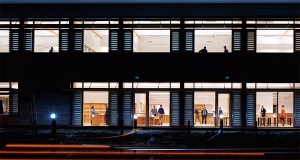 Hereford archive chooses passive preservation
Hereford archive chooses passive preservation -
 Low energy Tipperary offices go for gold
Low energy Tipperary offices go for gold -
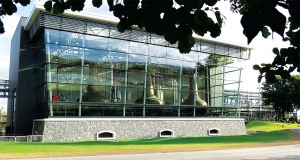 Irish whiskey distillery puts fabric first
Irish whiskey distillery puts fabric first -
Opinion
-
Thermal bridging

